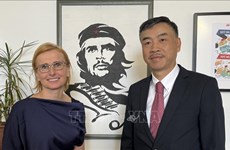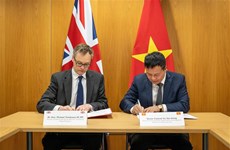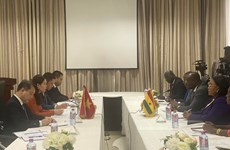Apolitical military – groundless claim
Associate Prof Dr Nguyen Ngoc Hoi, former editor-in-chief of the All
People Defence Magazine, has emphasised the need to build a politically
strong army and dismissed the view on apolitical military as a
groundless claim in a recent article.
In the
article, he pointed out that the concept of “apolitical military” has
appeared for long time and is used by opposition parties in multi-party
countries to limit the military’s intervention in political fights.
Associate Prof Dr Nguyen Ngoc Hoi, former editor-in-chief of the All
People Defence Magazine, has emphasised the need to build a politically
strong army and dismissed the view on apolitical military as a
groundless claim in a recent article.
In the article, he pointed out that the concept of “apolitical military” has appeared for long time and is used by opposition parties in multi-party countries to limit the military’s intervention in political fights.
The veteran journalist noted that in the last decades of the 20th century, imperialism switched to the “peace evolution” strategy to undermine socialism after invasion wars failed. One of the ploys they used to play was to introduce the view “the military must maintain its political neutrality” to socialist countries with one party (the communist party) rule with the aim of depoliticising the revolutionary armed forces. This was actually intended to separate the military from the leadership of the communist party and disable the military’s role as the party and state’s forceful tool in the cause of national construction and defence.
The tactic was successful in the Soviet Union, where leaders of the country’s party, state and army themselves dropped the Marxist – Leninist principle of building a politically strong military. They made serious mistakes such as abolishing the leadership of the Communist Party over the military, and depoliticising and neutralising the Soviet army, which was one of the important causes of the collapse of the Soviet Union in late 1991.
For Vietnam, hostile forces are carrying out the tactic of calling for “armed forces to maintain political neutrality”. It is actually to demand for depoliticising the Vietnam People’s Army (VPA).
They hope that, once the armed forces are deluded by the slogan, and military officers lose their political orientation, they would overthrow the Communist Party of Vietnam and the socialist political institution in Vietnam, in line with the scenario of "winning without fighting".
To realise the scheme, hostile forces have used all means, both theoretical and ideological together with real actions. With the aim of eliminating the revolutionary achievements in Vietnam and driving the country’s development path into the orbit of capitalism, they have stepped up campaigns demanding a multi-party regime over the past many years, which would inevitably lead to the eradication of the leadership of the Communist Party of Vietnam over the VPA.
They openly demanded abolishing the provision on the leadership of the Communist Party of Vietnam over the State and society as well as the provision that the armed forces are loyal to the Communist Party of Vietnam as stated in the Constitution of the socialist Vietnam.
The goal of these tricks is to push the "self evolution", "self transformation" process within the military, making it deviate from the revolutionary goals and ideals and the leadership of the Party, towards neutralising the military’s role as a firm support of the Party, State and people in the cause of national defence.
The tricks are sophisticated and furtively, but wrong in terms of both theory and reality, Hoi affirmed.
From the theoretical angle, the view on apolitical military has no remarkable foundation. According to the widely-recognised idea "War is the continuation of politics" initiated by the well-known military theorist Clausewitz (1780-1831), the military came into being to meet the needs of war (either offensive or defensive). Any war has its own political goal, reflecting the political stance of the sides, so the participating militaries are all geared to serve the political goals of the war. This means there can never be an apolitical army.
Second, the military, as part of the State, always bears the class nature of the State that organises and nurtures it. The military is the armed tool of the State to protect the achievements that the ruling political forces have obtained through the struggle for power.
The founding history of the military always associates with the birth of the State; while the State is the inevitable product of the class struggle, so any State bears the characteristics of the ruling class.
As part of the State, the armed forces of any society depend on the political orientation of the ruling class. At the same time, ruling political forces always do their best to firmly control the armed forces through political, ideological, organisational and policy measures.
Therefore, ever since its appearance, the military has been "imbued" with the politics of the State and the class holding power in society. There has never been and cannot be a so-called "politically neutral" military, or an army "staying out of politics" as preached by the capitalist class in order to cover the nature of the military in capitalist countries.
In reality, no military of any countries is "politically neutral" or "stays out of politics" so far because the military is the tool of armed force to protect political institutions of the ruling political forces.
It is not difficult to notice the involvement of the military in politics in many countries, like when military coups occur in many places, especially in Asia and Africa, in recent years.
In some countries such as the US, the UK and France, the military is used not only to safeguard national independence, sovereignty, and the nation, but also for other activities such as invasion, overthrowing and intervention in other sovereign nations with the political aim of erecting pro-Western governments. These acts in fact aim to serve the ruling political parties’ internal and external policies, which ultimately is the interests of the capitalist forces behind incumbent governments.
Looking back on Vietnam’s history of struggles for national liberation against the French colonialists, Japanese fascists and US imperialists, it is clear that these countries’ armies were never "politically neutral", especially when their military officers had been educated about their "mission" to go to Vietnam to stop the wave of communism from spreading throughout Southeast Asia.
Another point is that in countries with multi-party structure, any political party in power always tries their best to control the military because it will make it easier for them to maintain the power.
It is a well known fact that the Vietnam People’s Army was born from the masses’ political movements and it was organised, trained and led by the Communist Party of Vietnam to win and protect the revolutionary administration, so the army itself is a political force.
The VPA’s 70-year history of development attests to a historic fact that the VPA is a political force absolutely loyal to the Party, the country and people. This is first of all reflected in the unity of the VPA’s fighting goals and the Party’s political objectives, which is national independence in close association with socialism.
President Ho Chi Minh has emphasised many times the need to build a politically strong army. During his visit to the military politics school (now the Academy of Politics) on October 25, 1951, he advised students to study hard in all aspects of politics and military, stressing that “military without politics is like a tree without root, useless and harmful”.
Building a politically strong military by strengthening the Party’s leadership and fostering the military’s working class nature combined with building the military’s people-ness and nation-ness were a success lesson that the Party and President Ho Chi Minh have drawn out when flexibly applying Marxism-Leninism to the process of building a new-style army of the proletarian class in a country with an under-developed economy.
The history of Vietnam’s revolution attested to the correctness of this lesson. Since its inception, the VPA’s predecessor – the Vietnam Armed Propaganda Unit for National Liberation was organised under the model of party leadership with a political officer specialising in Party and political affairs.
Reality also shows that without the Party’s leadership, the armed forces would degenerate, lose their political orientation and fighting targets. They would no longer be the armed force of the people and a political force fighting for the goal of national independence and socialism, and so they cannot fulfil the function of safeguarding the country and people.
Building a politically-strong military is a top basic principle in building a revolutionary, elite and modernised army of the people.
This is the responsibility of the entire political system under the leadership of the Party. It is also the responsibility of the VPA itself, including the exposure of tricks and ploys aimed at "depoliticising" the army, Dr Nguyen Ngoc Hoi wrote in conclusion.-VNA
In the article, he pointed out that the concept of “apolitical military” has appeared for long time and is used by opposition parties in multi-party countries to limit the military’s intervention in political fights.
The veteran journalist noted that in the last decades of the 20th century, imperialism switched to the “peace evolution” strategy to undermine socialism after invasion wars failed. One of the ploys they used to play was to introduce the view “the military must maintain its political neutrality” to socialist countries with one party (the communist party) rule with the aim of depoliticising the revolutionary armed forces. This was actually intended to separate the military from the leadership of the communist party and disable the military’s role as the party and state’s forceful tool in the cause of national construction and defence.
The tactic was successful in the Soviet Union, where leaders of the country’s party, state and army themselves dropped the Marxist – Leninist principle of building a politically strong military. They made serious mistakes such as abolishing the leadership of the Communist Party over the military, and depoliticising and neutralising the Soviet army, which was one of the important causes of the collapse of the Soviet Union in late 1991.
For Vietnam, hostile forces are carrying out the tactic of calling for “armed forces to maintain political neutrality”. It is actually to demand for depoliticising the Vietnam People’s Army (VPA).
They hope that, once the armed forces are deluded by the slogan, and military officers lose their political orientation, they would overthrow the Communist Party of Vietnam and the socialist political institution in Vietnam, in line with the scenario of "winning without fighting".
To realise the scheme, hostile forces have used all means, both theoretical and ideological together with real actions. With the aim of eliminating the revolutionary achievements in Vietnam and driving the country’s development path into the orbit of capitalism, they have stepped up campaigns demanding a multi-party regime over the past many years, which would inevitably lead to the eradication of the leadership of the Communist Party of Vietnam over the VPA.
They openly demanded abolishing the provision on the leadership of the Communist Party of Vietnam over the State and society as well as the provision that the armed forces are loyal to the Communist Party of Vietnam as stated in the Constitution of the socialist Vietnam.
The goal of these tricks is to push the "self evolution", "self transformation" process within the military, making it deviate from the revolutionary goals and ideals and the leadership of the Party, towards neutralising the military’s role as a firm support of the Party, State and people in the cause of national defence.
The tricks are sophisticated and furtively, but wrong in terms of both theory and reality, Hoi affirmed.
From the theoretical angle, the view on apolitical military has no remarkable foundation. According to the widely-recognised idea "War is the continuation of politics" initiated by the well-known military theorist Clausewitz (1780-1831), the military came into being to meet the needs of war (either offensive or defensive). Any war has its own political goal, reflecting the political stance of the sides, so the participating militaries are all geared to serve the political goals of the war. This means there can never be an apolitical army.
Second, the military, as part of the State, always bears the class nature of the State that organises and nurtures it. The military is the armed tool of the State to protect the achievements that the ruling political forces have obtained through the struggle for power.
The founding history of the military always associates with the birth of the State; while the State is the inevitable product of the class struggle, so any State bears the characteristics of the ruling class.
As part of the State, the armed forces of any society depend on the political orientation of the ruling class. At the same time, ruling political forces always do their best to firmly control the armed forces through political, ideological, organisational and policy measures.
Therefore, ever since its appearance, the military has been "imbued" with the politics of the State and the class holding power in society. There has never been and cannot be a so-called "politically neutral" military, or an army "staying out of politics" as preached by the capitalist class in order to cover the nature of the military in capitalist countries.
In reality, no military of any countries is "politically neutral" or "stays out of politics" so far because the military is the tool of armed force to protect political institutions of the ruling political forces.
It is not difficult to notice the involvement of the military in politics in many countries, like when military coups occur in many places, especially in Asia and Africa, in recent years.
In some countries such as the US, the UK and France, the military is used not only to safeguard national independence, sovereignty, and the nation, but also for other activities such as invasion, overthrowing and intervention in other sovereign nations with the political aim of erecting pro-Western governments. These acts in fact aim to serve the ruling political parties’ internal and external policies, which ultimately is the interests of the capitalist forces behind incumbent governments.
Looking back on Vietnam’s history of struggles for national liberation against the French colonialists, Japanese fascists and US imperialists, it is clear that these countries’ armies were never "politically neutral", especially when their military officers had been educated about their "mission" to go to Vietnam to stop the wave of communism from spreading throughout Southeast Asia.
Another point is that in countries with multi-party structure, any political party in power always tries their best to control the military because it will make it easier for them to maintain the power.
It is a well known fact that the Vietnam People’s Army was born from the masses’ political movements and it was organised, trained and led by the Communist Party of Vietnam to win and protect the revolutionary administration, so the army itself is a political force.
The VPA’s 70-year history of development attests to a historic fact that the VPA is a political force absolutely loyal to the Party, the country and people. This is first of all reflected in the unity of the VPA’s fighting goals and the Party’s political objectives, which is national independence in close association with socialism.
President Ho Chi Minh has emphasised many times the need to build a politically strong army. During his visit to the military politics school (now the Academy of Politics) on October 25, 1951, he advised students to study hard in all aspects of politics and military, stressing that “military without politics is like a tree without root, useless and harmful”.
Building a politically strong military by strengthening the Party’s leadership and fostering the military’s working class nature combined with building the military’s people-ness and nation-ness were a success lesson that the Party and President Ho Chi Minh have drawn out when flexibly applying Marxism-Leninism to the process of building a new-style army of the proletarian class in a country with an under-developed economy.
The history of Vietnam’s revolution attested to the correctness of this lesson. Since its inception, the VPA’s predecessor – the Vietnam Armed Propaganda Unit for National Liberation was organised under the model of party leadership with a political officer specialising in Party and political affairs.
Reality also shows that without the Party’s leadership, the armed forces would degenerate, lose their political orientation and fighting targets. They would no longer be the armed force of the people and a political force fighting for the goal of national independence and socialism, and so they cannot fulfil the function of safeguarding the country and people.
Building a politically-strong military is a top basic principle in building a revolutionary, elite and modernised army of the people.
This is the responsibility of the entire political system under the leadership of the Party. It is also the responsibility of the VPA itself, including the exposure of tricks and ploys aimed at "depoliticising" the army, Dr Nguyen Ngoc Hoi wrote in conclusion.-VNA













